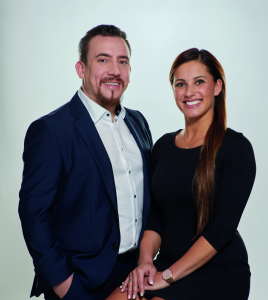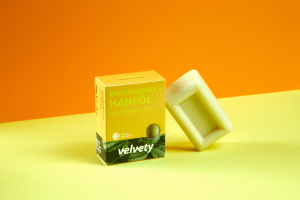True Stories
Reduce waste and improve the ecological footprint: meet Velvety
Michaela Schatzer, Founder and Product Developer and R&D
 As a trained druggist, Michaela Schatzer has the professional knowledge and has been familiar with the subject of natural and organic cosmetics for many years. She and her team in the R&D develop innovative formulas with a lot of passion, always oriented towards the current trends in the cosmetics industry.
As a trained druggist, Michaela Schatzer has the professional knowledge and has been familiar with the subject of natural and organic cosmetics for many years. She and her team in the R&D develop innovative formulas with a lot of passion, always oriented towards the current trends in the cosmetics industry.
Patrick Schatzer, Founder and CEO
Patrick Schatzer is an import/export wholesaler with a lot of international experience. Together with his wife Michaela, he founded Velvety Manufaktur GmbH, which has been on the road to success ever since thanks to their know-how and his commercial and logistical knowledge.
NATRUE: Why and when was your brand created?
Michaela Schatzer: The founders, while spending time at the sea with their children, witnessed the distressing sight of plastic bottles polluting the ocean. This experience motivated them to find a solution that would eliminate the need for plastic bottles in the beauty industry. By developing solid cosmetics, among other things solid shampoo, the brand aimed to provide a sustainable alternative that would reduce plastic waste. Velvety, as the first brand to successfully market solid shampoo, played a pioneering role in promoting and popularizing this environmentally friendly alternative. Therefore, the brand was founded in 2015 to sustainably and continuously improve the ecological footprint, reduce (plastic) waste and bring people along on this journey.
NATRUE: Your products are free of microplastics, CO2 neutral and handmade manufactured. Are Velvety’s products also committed with the “less waste” trend?
Michaela Schatzer: Yes, our products at Velvety are committed to the “less waste” trend. We prioritize the use of paper packaging for our solid cosmetic products, which helps us reduce waste by minimizing the amount of non-biodegradable materials in our packaging.
An important aspect of the “less waste” trend is the rise of water-free products, which are particularly relevant in the face of growing water scarcity. Water scarcity is a pressing global issue caused by factors like climate change and unsustainable water management. Water-free products minimize or eliminate the need for water in their production processes, reducing water consumption and alleviating strain on water supplies. In this sense, the concept of a “water footprint” helps us understand the water usage associated with products and activities. Velvety’s products try to meet this concept by embracing water-free products and reducing our water footprint. We also help consumers by putting products on the market that can meet their expectations.
In addition to that, our products are free of microplastics and CO2 neutral, further contributing to the “less waste” trend. We believe that excluding microplastics from our formulations is crucial to preventing environmental pollution and protecting marine life. Also, being CO2 neutral means that we take active steps to minimize and offset the carbon emissions associated with our products’ production and distribution. This commitment aligns with our sustainable practices and our goal of reducing our environmental impact.
Overall, we try to do our best by using paper packaging, water-free products, and excluding microplastics from our formulas and packaging. All these actions demonstrate our dedication to the “less waste” trend and our efforts to create environmentally conscious cosmetic products.
NATRUE: What does “self-preserving” means?
Michaela Schatzer: “Self-preserving” refers to a formulation or product that can maintain its integrity and prevent microbial growth without traditional preservatives. Unlike many cosmetic products that require synthetic or additional preservatives to prevent spoilage and maintain safety, self-preserving formulations use natural ingredients and techniques to inhibit microbial growth. This extends the product’s shelf life while avoiding synthetic or chemical preservatives.
Self-preserving formulations often utilize natural components with antimicrobial properties, such as plant extracts or essential oils. They undergo rigorous testing to ensure safety and efficacy, offering consumers a more natural and environmentally friendly alternative.
NATRUE: What is the difference between the solid shower and the solid shower soap?
Michaela Schatzer: The difference between a solid shower and a solid shower soap lies in their formulation and purpose. A solid shower is designed to cleanse and moisturize the skin, similar to liquid shower gel or body wash. It creates a lather or foam when used on wet skin. On the other hand, a solid shower soap is primarily formulated for cleansing purposes, typically made with saponified oils or fats to create soap molecules. It focuses on effectively removing dirt, oil, and impurities.
While both are used for bathing, solid showers provide cleansing and moisturizing benefits, while solid shower soaps prioritize cleansing. Product formulations may vary between brands, so referring to product descriptions and ingredient lists is recommended to understand specific characteristics and benefits.
NATRUE: What would you say to brands that want to join NATRUE? And to consumers that look for truly natural and organic cosmetic products?
Michaela Schatzer: Joining NATRUE demonstrates your commitment to producing natural and organic cosmetic products. It aligns your brand with a globally recognized certification, providing transparency and confidence to consumers.
Special note to Consumers: Choosing NATRUE-certified brands ensures that you’re buying a truly natural and organic cosmetic product. The certification guarantees rigorous evaluation, authentic ingredients, sustainable practices, and supports a healthier, more sustainable beauty routine.

For more information about velvety, visit www.velvety.eu
Download the interview here.



 Deutsch
Deutsch
 Español
Español
 Français
Français
 Italiano
Italiano
